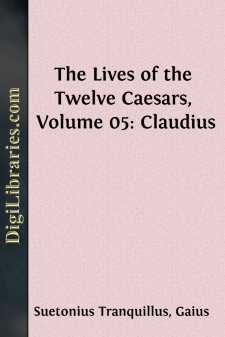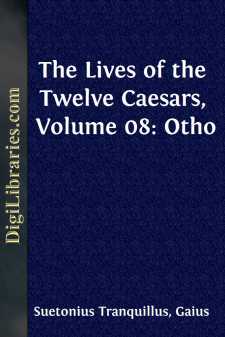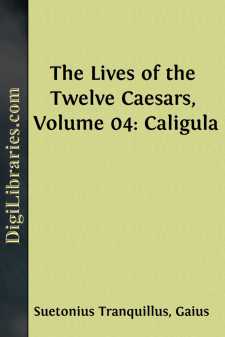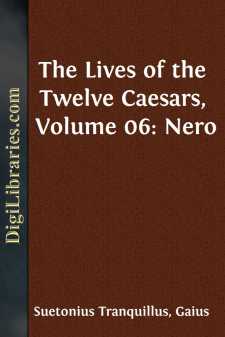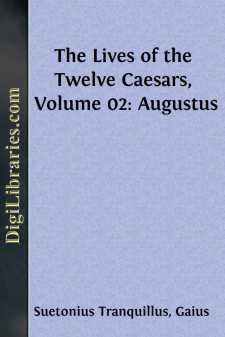Categories
- Antiques & Collectibles 13
- Architecture 36
- Art 48
- Bibles 22
- Biography & Autobiography 813
- Body, Mind & Spirit 142
- Business & Economics 28
- Children's Books 14
- Children's Fiction 11
- Computers 4
- Cooking 94
- Crafts & Hobbies 4
- Drama 346
- Education 46
- Family & Relationships 57
- Fiction 11829
- Games 19
- Gardening 17
- Health & Fitness 34
- History 1377
- House & Home 1
- Humor 147
- Juvenile Fiction 1873
- Juvenile Nonfiction 202
- Language Arts & Disciplines 88
- Law 16
- Literary Collections 686
- Literary Criticism 179
- Mathematics 13
- Medical 41
- Music 40
- Nature 179
- Non-Classifiable 1768
- Performing Arts 7
- Periodicals 1453
- Philosophy 64
- Photography 2
- Poetry 896
- Political Science 203
- Psychology 42
- Reference 154
- Religion 513
- Science 126
- Self-Help 84
- Social Science 81
- Sports & Recreation 34
- Study Aids 3
- Technology & Engineering 59
- Transportation 23
- Travel 463
- True Crime 29
The Lives of the Twelve Caesars, Volume 05: Claudius
Description:
Excerpt
I. Livia, having married Augustus when she was pregnant, was within three months afterwards delivered of Drusus, the father of Claudius Caesar, who had at first the praenomen of Decimus, but afterwards that of Nero; and it was suspected that he was begotten in adultery by his father-in-law. The following verse, however, was immediately in every one's mouth:
Tois eutychousi kai primaena paidia.
Nine months for common births the fates decree;
But, for the great, reduce the term to three.
This Drusus, during the time of his being quaestor and praetor, commanded in the Rhaetian and German wars, and was the first of all the Roman generals who navigated the Northern Ocean [466]. He made likewise some prodigious trenches beyond the Rhine [467], which to this day are called by his name. He overthrew the enemy in several battles, and drove them far back into the depths of the desert. Nor did he desist from pursuing them, until an apparition, in the form of a barbarian woman, of more than human size, appeared to him, and, in the Latin tongue, forbad him to proceed any farther. For these achievements he had the honour of an ovation, and the triumphal ornaments. After his praetorship, he immediately entered on the office of consul, and returning again to Germany, died of disease, in the summer encampment, which thence obtained the name of "The Unlucky Camp." His corpse was carried to Rome by the principal persons of the several municipalities and colonies upon the road, being met and received by the recorders of each place, and buried in the Campus Martius. In honour of his (296) memory, the army erected a monument, round which the soldiers used, annually, upon a certain day, to march in solemn procession, and persons deputed from the several cities of Gaul performed religious rites. The senate likewise, among various other honours, decreed for him a triumphal arch of marble, with trophies, in the Appian Way, and gave the cognomen of Germanicus to him and his posterity. In him the civil and military virtues were equally displayed; for, besides his victories, he gained from the enemy the Spolia Opima [468], and frequently marked out the German chiefs in the midst of their army, and encountered them in single combat, at the utmost hazard of his life. He likewise often declared that he would, some time or other, if possible, restore the ancient government. In this account, I suppose, some have ventured to affirm that Augustus was jealous of him, and recalled him; and because he made no haste to comply with the order, took him off by poison. This I mention, that I may not be guilty of any omission, more than because I think it either true or probable; since Augustus loved him so much when living, that he always, in his wills, made him joint-heir with his sons, as he once declared in the senate; and upon his decease, extolled him in a speech to the people, to that degree, that he prayed the gods "to make his Caesars like him, and to grant himself as honourable an exit out of this world as they had given him." And not satisfied with inscribing upon his tomb an epitaph in verse composed by himself, he wrote likewise the history of his life in prose. He had by the younger Antonia several children, but left behind him only three, namely, Germanicus, Livilla, and Claudius.
II. Claudius was born at Lyons, in the consulship of Julius Antonius, and Fabius Africanus, upon the first of August [469], the very day upon which an altar was first dedicated there to Augustus....


